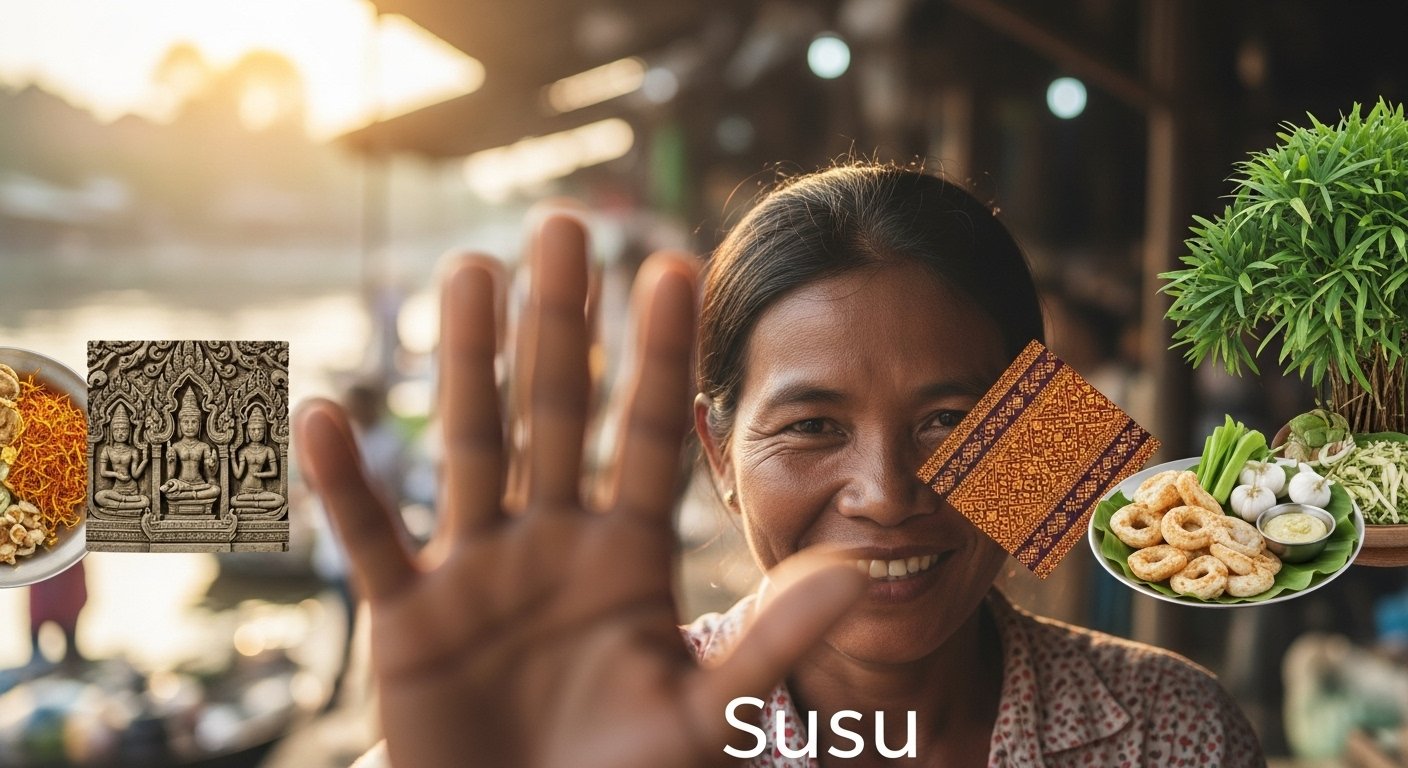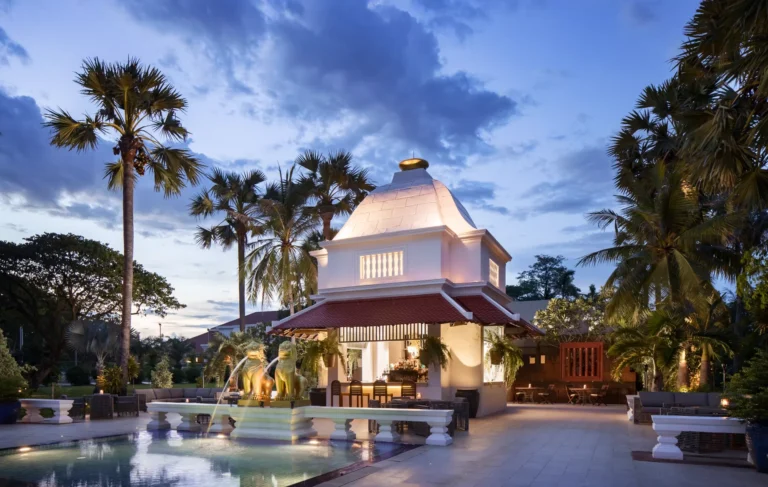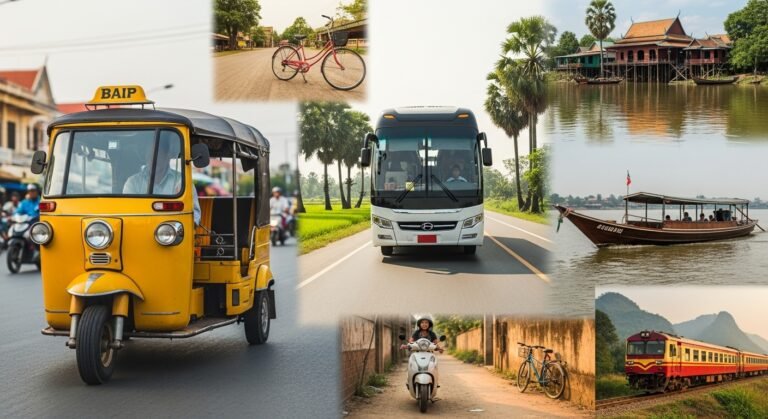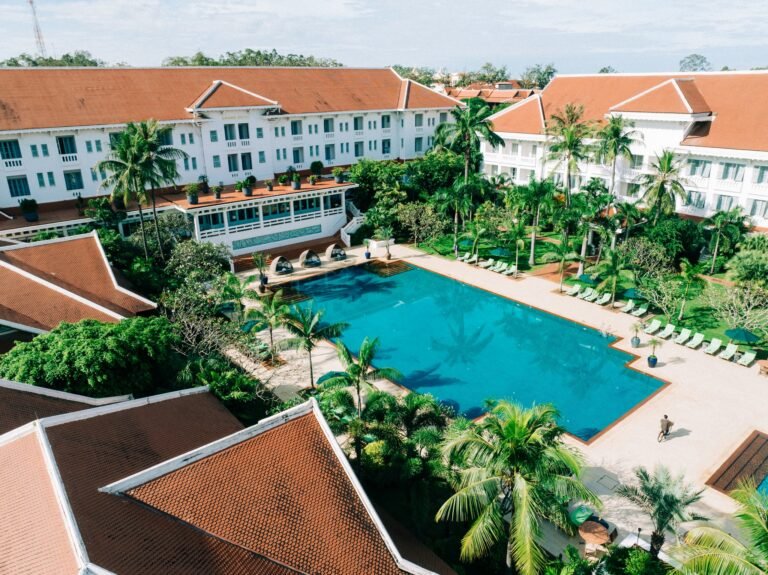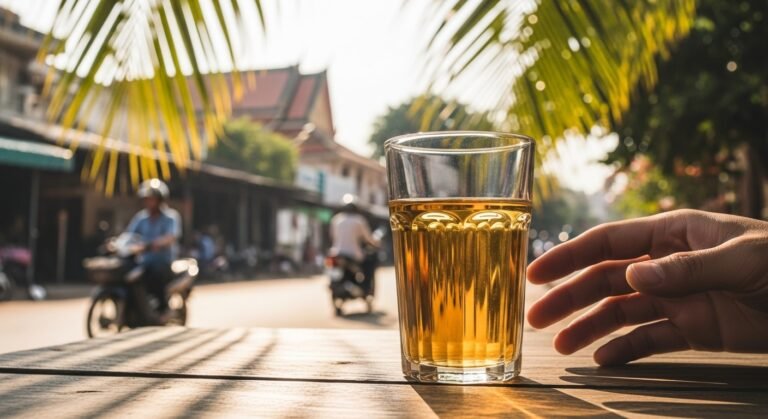Essential Khmer Phrases for Tourists: Speak Like a Local
Welcome to Cambodia, the ‘Kingdom of Wonder’! As a first-time tourist, immersing yourself in the local culture is an unforgettable part of the adventure. And what better way to do that than by learning some essential Khmer phrases for tourists? While English is commonly spoken in major tourist hubs like Phnom Penh and Siem Reap, knowing basic Cambodian greetings and a few survival Khmer phrases can significantly enhance your experience, especially in rural areas where English proficiency is less common [Stat 3]. This guide is designed to equip you with the most useful phrases in Cambodia, making your interactions with locals more meaningful and enjoyable.
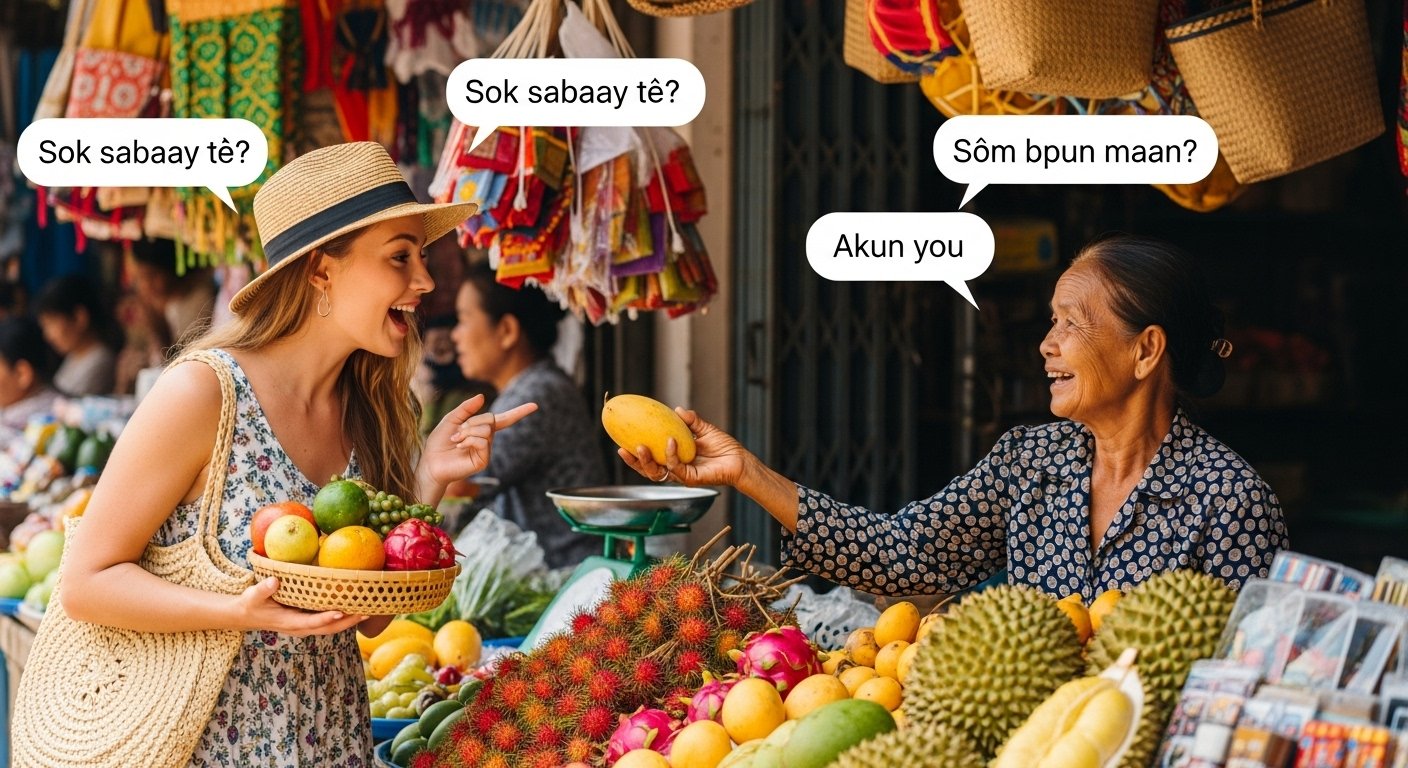
Cambodia welcomed an impressive 6,700,125 international tourists in 2024, marking a significant 22.9% increase from the previous year, highlighting its growing appeal [Stat 1]. The tourism industry itself plays a vital role, accounting for 9.4% of the country’s GDP in 2024 [Stat 2]. This influx of visitors underscores the importance of fostering positive interactions, and a few polite phrases in Khmer can go a long way in showing respect and building connections. For those wondering, “How hard is it to learn Khmer for short trips?” the good news is that Khmer is considered relatively easier for English speakers to learn compared to neighboring languages like Thai and Vietnamese, as it is not a tonal language [Stat 4]. So, let’s dive into mastering some must-know Khmer phrases for your Cambodian journey!
Is it Necessary to Learn Khmer for Cambodia? Do Locals Speak English in Cambodia?
While you can certainly “get by” in major tourist areas like Siem Reap (home to Angkor Wat) and Phnom Penh with English, relying solely on it can limit your experience. Many tuk-tuk drivers, hotel staff, and vendors in these areas have a basic grasp of English. However, venturing into local markets or smaller towns will quickly reveal that English isn’t as widely spoken. Learning a few common Khmer words for tourists demonstrates respect for Cambodian culture and opens doors to more authentic interactions. It signals to locals that you’re interested in their country, which is often met with warm smiles and helpfulness. For comprehensive planning, check out our First-Time Cambodia Travel Guide: Ultimate Beginner’s Plan.
Basic Cambodian Greetings and Essential Polite Phrases
Starting with greetings and polite expressions is fundamental to any language learning journey. These are your foundational Khmer travel phrases that will be used countless times a day and are easy Khmer phrases to remember. Mastering “How to say hello in Khmer” and “Thank you in Khmer” will make a significant impact.
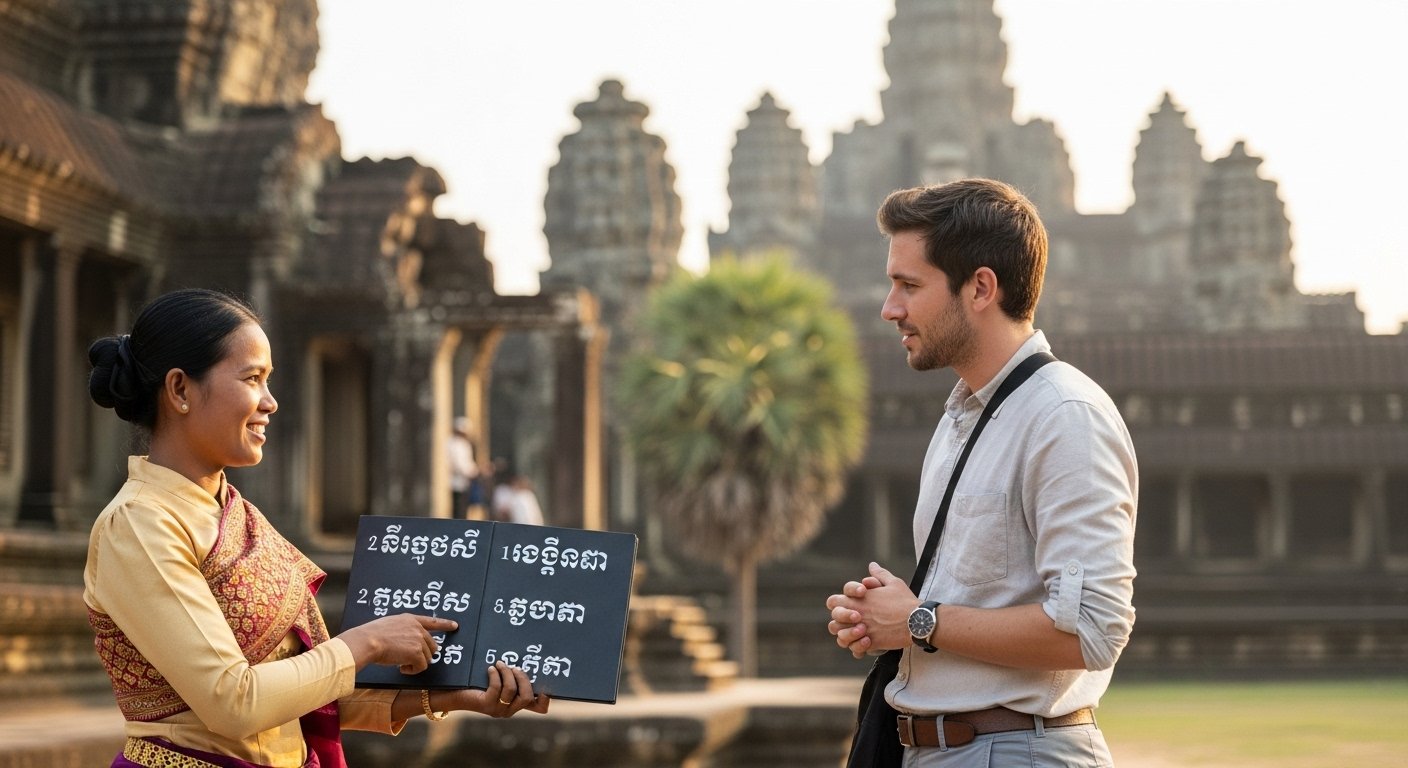
Here are the most essential greetings and polite phrases:
- Hello (formal): `Choum Reap Sour` (pronounced: `Chom-reap-so`) ជំរាបសួរ
- *Usage:* This is the formal way to say hello, suitable for anyone, especially elders or those in positions of authority.
- Hello (informal): `Sour Sdey` (pronounced: `Sore-sdey`) សួស្ដី
- *Usage:* A casual greeting, perfect for friends or people your own age. Locals might use it with you too.
- Goodbye (formal): `Choum Reap Lear` (pronounced: `Chom-reap-lea`) ជម្រាបលា
- Goodbye (informal): `Leah Hey` (pronounced: `Lea-hoy`) លាហើយ
- Thank you: `Orkurn` (pronounced: `Or-koon`) អរគុណ
- *Usage:* This is one of the most important must-know Khmer phrases. Always say “Orkurn” after receiving help or service. To say “Thank you very much,” you can add `Chran` (`Orkurn Chran`).
- Please / You’re welcome: `Som` (pronounced: `Som`) សូម
- *Usage:* `Som` can mean both “please” and “you’re welcome” depending on context. For “please,” it often precedes a request, like `Som oy` (Please give me). As “you’re welcome,” it’s used as a reply to `Orkurn`.
- Excuse me / Sorry: `Som toh` (pronounced: `Som-toe`) សូមទោស
- Yes (male speaker): `Baht` (pronounced: `Baht`) បាទ
- Yes (female speaker): `Jah` (pronounced: `Jah`) ចាស
- No: `Tear` (pronounced: `Te`) ទេ
- I don’t understand: `Knyom min yol te` (pronounced: `Knyom min yoll te`) ខ្ញុំមិនយល់ទេ
Essential Khmer Phrases for Directions and Transportation
Navigating bustling cities like Phnom Penh or the temple-studded landscape around Angkor Wat often involves tuk-tuk drivers and local directions. These survival Khmer phrases will prove invaluable for getting around Cambodia. For practical tips on currency and payments, see our Cambodian Currency Guide: Tourists, Riel, USD, & Payment Tips.
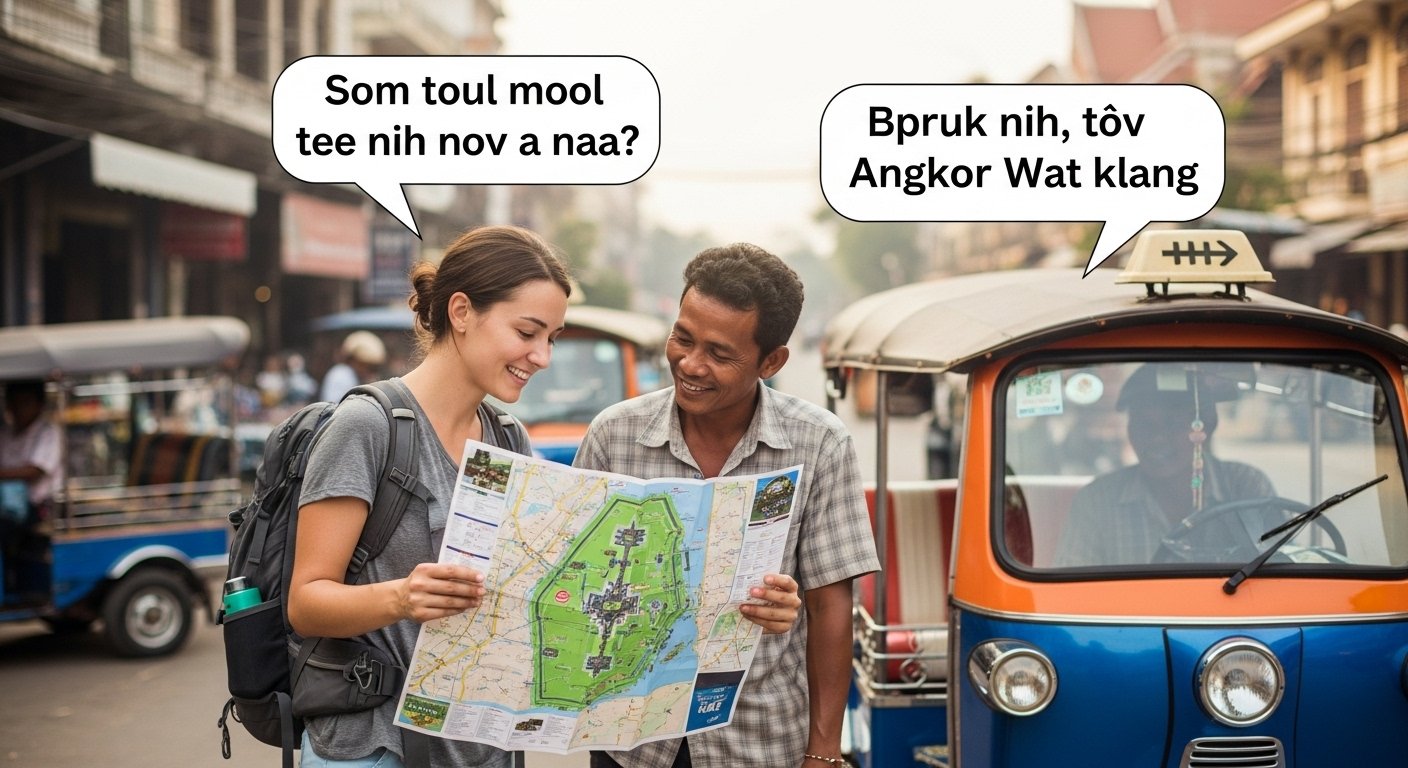
Here are key phrases for asking for directions in Khmer and using transportation:
- How much? `Tlai ponmaan?` (pronounced: `Tly-pon-man?`) ថ្លៃប៉ុន្មាន?
- *Usage:* Essential for bargaining at local markets or confirming prices with tuk-tuk drivers.
- Where is…? `Nao aye nah…?` (pronounced: `Now-eye-nah…?`) នៅឯណា…?
- *Example:* `Nao aye nah Angkor Wat?` (Where is Angkor Wat?)
- Go straight: `Trong` (pronounced: `Trong`) ត្រង់
- Turn left: `Bort chveng` (pronounced: `Bort-chveng`) បត់ឆ្វេង
- Turn right: `Bort sdam` (pronounced: `Bort-sdam`) បត់ស្តាំ
- Stop here: `Chop tinuh` (pronounced: `Chop-tee-nuh`) ឈប់ទីនេះ
- To the market: `Tov Psar` (pronounced: `Tov Psa`) ទៅផ្សារ
- *Usage:* `Psar` means market, a key entity. You might hear locals refer to the Central Market as `Psar Thmei` or the Russian Market as `Psar Toul Tom Pong`.
- I want to go to…: `Knyom jong tov…` (pronounced: `Knyom jong tov…`) ខ្ញុំចង់ទៅ…
- Faster / Slower: `Lueun / Yuut` (pronounced: `Luen / Yoot`) លឿន / យឺត
- Help!: `Chouy pong!` (pronounced: `Choo-y pong!`) ជួយផង!
Useful Khmer Phrases for Ordering Food
Cambodian cuisine is a delightful exploration of flavors. Being able to order food in Khmer, or at least understand some common Khmer words for tourists related to food, will enhance your culinary adventure. Don’t be shy to try the street food at local markets!
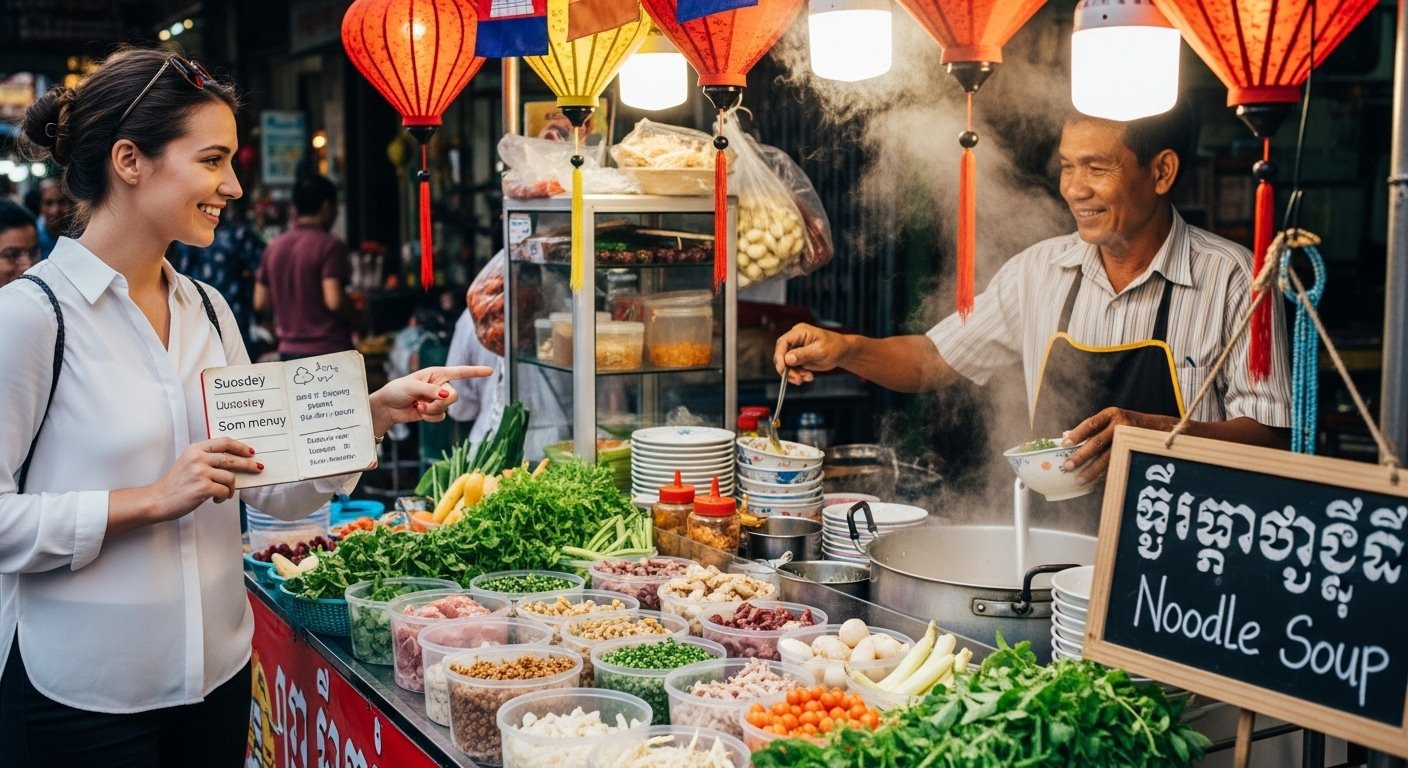
Spice up your dining experience with these phrases:
- Delicious!: `Chnganh! `(pronounced: `Ch-nganh!`) ឆ្ងាញ់!
- *Usage:* A great way to show appreciation for your meal.
- I want…: `Knyom jong…` (pronounced: `Knyom jong…`) ខ្ញុំចង់…
- *Example:* `Knyom jong bai` (I want rice).
- Water: `Teuk` (pronounced: `Teuk`) ទឹក
- Coffee: `Kafay` (pronounced: `Ka-fay`) កាហ្វេ
- Beer: `Bia` (pronounced: `Bee-ah`) ស្រាបៀរ
- No spicy: `Teu het` (pronounced: `Teu het`) ទេហិរ
- *Usage:* If you’re not a fan of chili, this is a crucial phrase.
- One / Two / Three: `Muoy / Pee / Bei` (pronounced: `Muoy / Pee / Bay`) មួយ / ពីរ / បី
- *Usage:* Useful for specifying quantities of dishes or drinks.
- The bill, please: `Som ket loy` (pronounced: `Som ket loy`) សូមគិតលុយ
- I am vegetarian: `Knyom chea bork bor` (pronounced: `Knyom chea bork bor`) ខ្ញុំជាបួស
Everyday Interactions and Survival Khmer Phrases
Beyond the basics, a few extra Khmer travel phrases can help you navigate more complex situations or simply engage in friendly banter. These useful phrases in Cambodia will elevate your interactions.
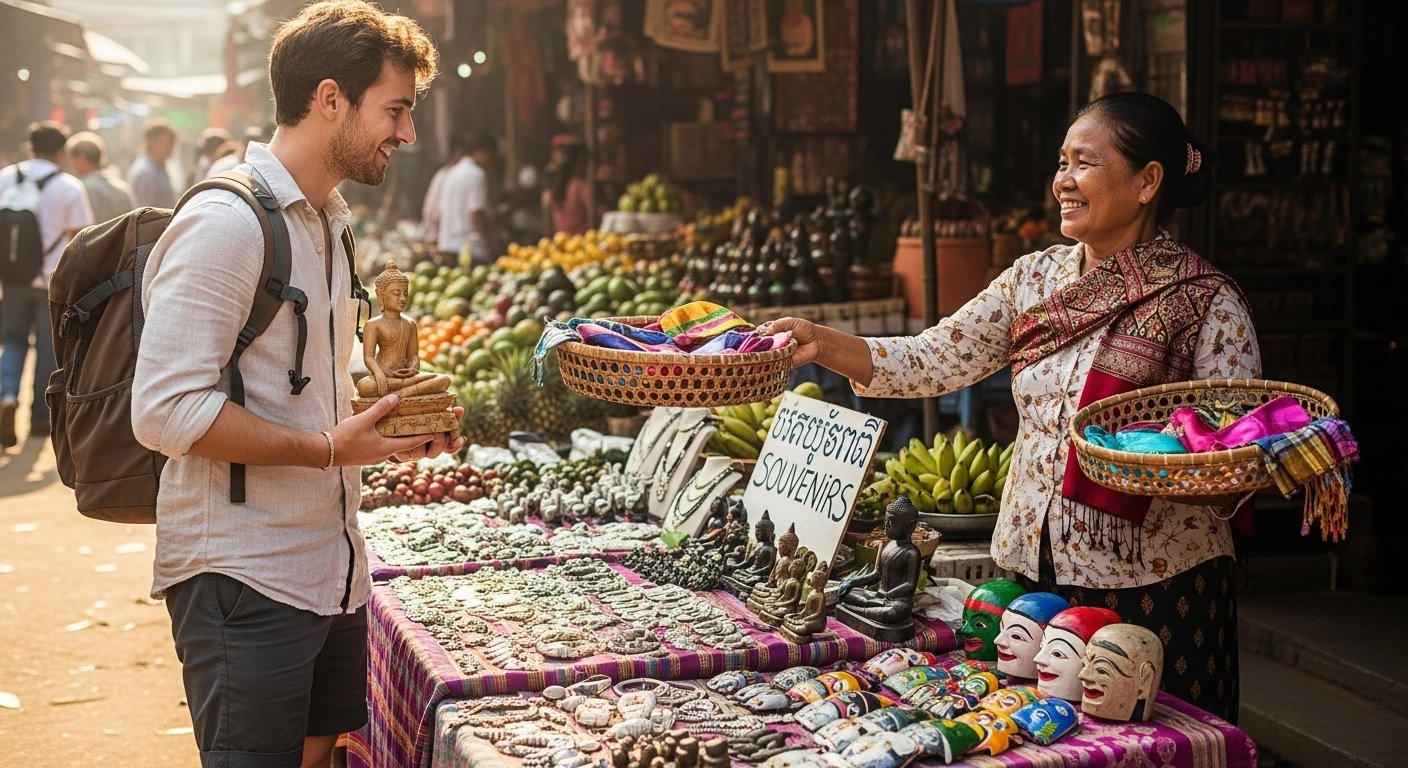
Broaden your conversational skills with these phrases:
- How are you? `Sok Sabay te?` (pronounced: `Sok-sa-bye-te?`) សុខសប្បាយទេ?
- *Reply:* `Sok Sabay` (I’m fine) សុខសប្បាយ
- What is your name? `Chhmuah ei?` (pronounced: `Ch-moo-ah ey?`) ឈ្មោះអ្វី?
- My name is… `Knyom chhmuah…` (pronounced: `Knyom ch-moo-ah…`) ខ្ញុំឈ្មោះ…
- How old are you? `Ayuk ponman?` (pronounced: `Ah-yook pon-man?`) អាយុប៉ុន្មាន?
- I am [number] years old: `Knyom ayuk [number] chnam` (pronounced: `Knyom ah-yook [number] ch-nam`) ខ្ញុំអាយុ [លេខ] ឆ្នាំ
- Where are you from? `Neak mok pi na?` (pronounced: `Neak mok pee na?`) អ្នកមកពីណា?
- I am from… `Knyom mok pi…` (pronounced: `Knyom mok pee…`) ខ្ញុំមកពី…
- No problem / It’s okay: `Min ei te` (pronounced: `Min-ay-te`) មិនអីទេ
- Cheers! `Choul Mouy!` (pronounced: `Choll-Moy!`) ចូលមួយ!
- *Usage:* A fun phrase to use when enjoying a drink with new friends.
- How much does this cost? `Nih tlay ponman?` (pronounced: `Nih tly pon-man?`) នេះថ្លៃប៉ុន្មាន?
- Can I take a photo? `Som thot roop ban te?` (pronounced: `Som thot roop ban te?`) សូមថតរូបបានទេ?
Cambodian Language Tips for Travelers & Pronunciation Guide
Learning a new language, even a few easy Khmer phrases, involves more than just memorizing words. Understanding a bit about Khmer pronunciation and cultural etiquette can make your interactions even smoother.
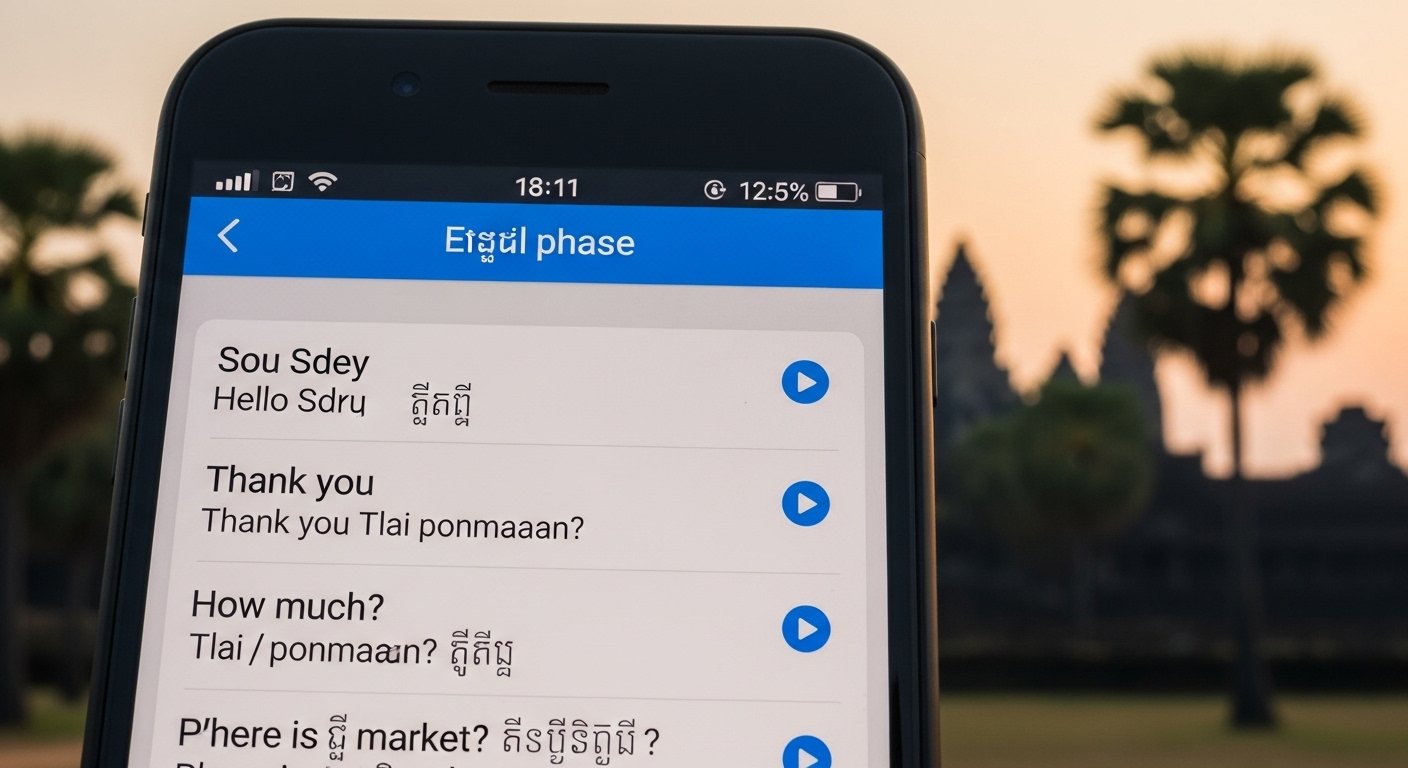
A Quick Khmer Pronunciation Guide
Khmer is an Austroasiatic language and, unlike many of its Southeast Asian neighbors, it is not tonal [Stat 4], which can be a relief for English speakers. However, it does have a rich vowel system and some consonant sounds that might be unfamiliar. Don’t worry about perfect pronunciation; effort is appreciated!
- Vowels: Khmer has many vowel sounds, some of which can be long or short. Pay attention to the phonetic spellings provided.
- Consonants: Some consonant clusters might seem tricky. Often, a ‘k’ sound can be softer, almost like a ‘g’. The ‘r’ sound is often rolled or trilled, similar to Spanish.
- Stress: Words are often stressed on the final syllable. [2]
- Practice: Listen to native speakers on YouTube or use language apps that provide audio. Don’t be afraid to try, even if you mispronounce something. Locals will usually understand your intent.
Cultural Etiquette with Khmer Phrases
- The Sampeah: This is the traditional Cambodian greeting, a prayer-like gesture with hands pressed together at chest level. It often accompanies “Choum Reap Sour” and is a sign of respect. The higher the hands and the deeper the bow, the greater the respect shown. Source: [Khmer language – Wikipedia]
- Politeness: Always try to use polite phrases in Khmer like `Som` (please) and `Orkurn` (thank you). A smile goes a long way!
- Bargaining: At local markets, bargaining is common, especially for souvenirs. Start with a polite greeting and a smile. Remember to be respectful and fair.
- Body Language: Avoid touching someone’s head, as it’s considered the most sacred part of the body. Also, try not to point with your feet, as they are considered the lowest and least clean part of the body.
For more information on the history and linguistic details of the Khmer language, you can refer to its Wikipedia page. Additionally, the Official Website for Tourism of Cambodia provides useful resources for travelers. Considering a Cambodian visa? Here’s our guide: How to Get a Cambodia Visa: Guide for Tourists.
Key Takeaways
- Learning even a few essential Khmer phrases significantly enhances your travel experience in Cambodia.
- Basic greetings like “Choum Reap Sour” (hello) and “Orkurn” (thank you) are crucial for polite interactions.
- Khmer is not a tonal language, making it relatively easier for English speakers to pick up.
- Using common phrases for directions, transportation, and ordering food will help you navigate and enjoy local cuisine.
- Always combine your spoken phrases with respectful cultural etiquette, such as the Sampeah.

